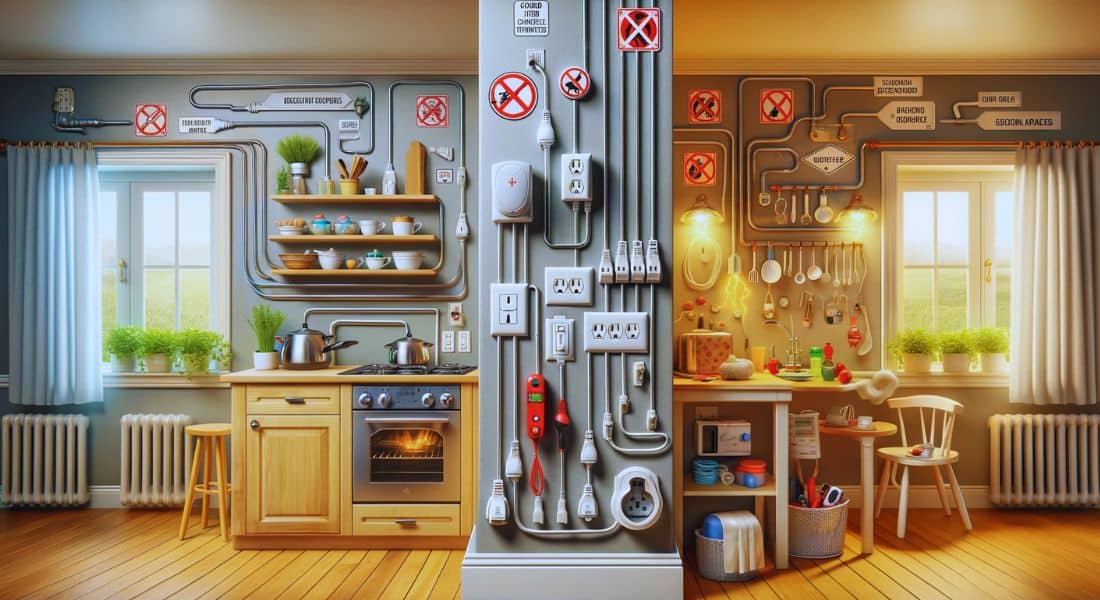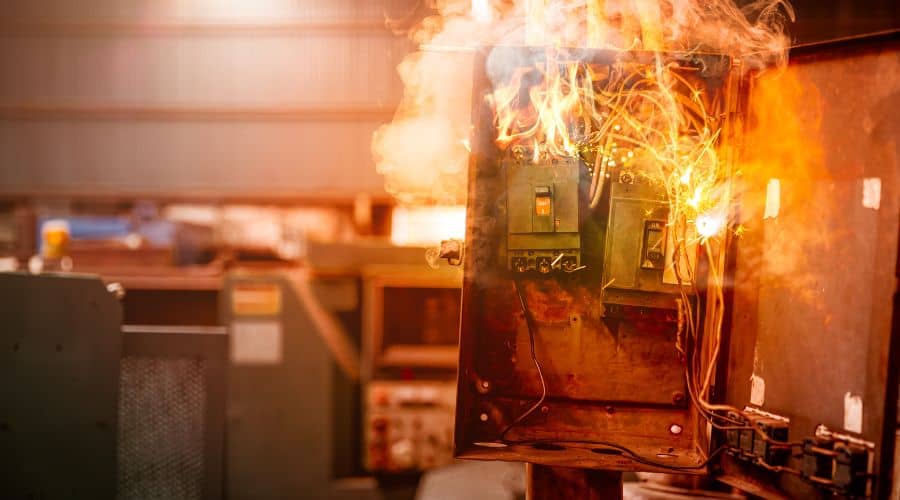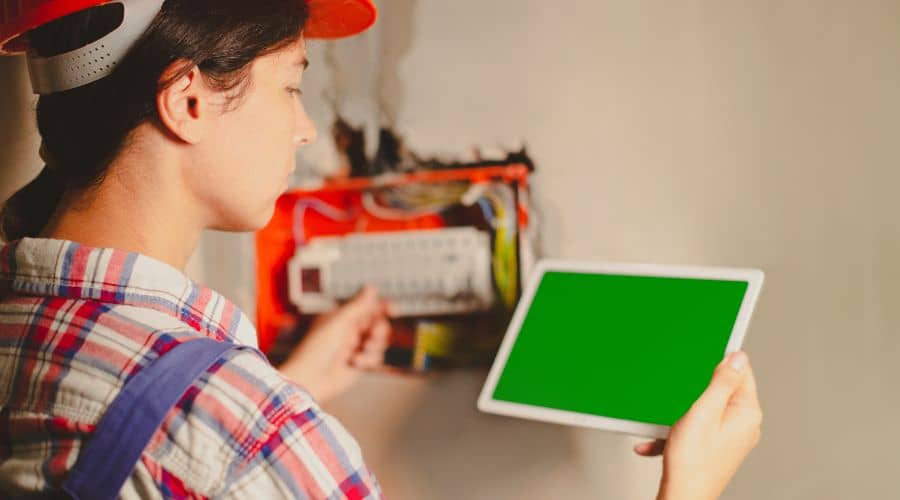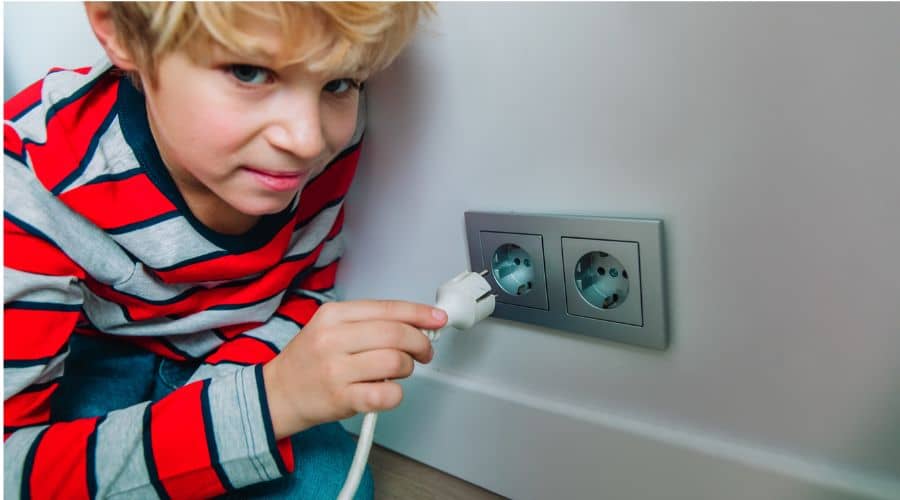How To Prevent electrical hazards at home
Written by Total Power Energy Team
Published:
did you know that approximately 51,000 house fires and 400 electrocutions annually in the U.S And here’s a shocker: On average, 400 people are electrocuted at home yearly, resulting in about 200 deaths. About 10% of these are due to large appliances.
Yikes, right? Let’s talk about something super important – How to prevent electrical hazards at home. Your home’s electrical system must be safe, not just cozy and bright.
This article focuses on practical steps to prevent such hazards. You’ll learn about common risks and receive actionable advice to safeguard your home.
Understanding and implementing these measures can significantly reduce the likelihood of accidents and ensure a safer living environment for you and your family.
What Are Some Common Electrical Hazards
We often overlook the simple things that can be natural electrical hazards. Loose wires, faulty appliances, and overcrowded power strips are just the tip of the iceberg.
These might seem harmless initially, but they can lead to serious problems like fires or electric shocks. Here are some of the most common problems:
- Frayed or Damaged Electrical Cords
- Overloaded Power Outlets and Extension cables
- Appliances Used Near Water
- Loose or Improperly Installed Wall Outlets
- Exposed Electrical Wiring
- Overheating of Light Fixtures and Bulbs
- Using Incorrect Wattage for Light Bulbs
- DIY Electrical Repairs Without Proper Knowledge
- Unprotected Electrical Outlets in Homes with Children
- Plugging in Too Many Appliances into a Single Outlet
- Running Cords Under Carpets or Rugs
- Faulty or Aging Electrical Appliances
- Lack of (GFCIs) in Wet Areas
- Improper Use of Extension wires
The Main Causes of Electrical Accidents in Homes
Most electrical accidents at home stem from a few key issues. It’s often the small things we overlook, like using a hairdryer near a sink or jamming too many plugs into one outlet.
Old Wiring: A Risky Business
In older homes, outdated wiring can be a significant risk. It may not handle the modern electrical load, leading to overheating and potential fires.
DIY Repairs: A Double-Edged Sword
We all love a good DIY project, but it’s best to leave it to the professionals regarding electrical repairs. A wrong move here can be more than just a minor mishap.
How To Identifying Potential Electrical Hazards in the Home
Identifying potential electrical hazards is like playing detective in your home. You’ve got to keep an eye out for the usual suspects – flickering lights, strange noises from outlets, or that toaster that just doesn’t seem to toast like it used to.
- Listen and Look: Sometimes, your home will talk to you – humming sounds from an outlet or lights that flicker are not just quirky house traits but warnings.
- Feel the Heat: Appliances that get unusually hot send you a red flag. It’s essential to pay attention to these signs before they escalate.
14 easy Ways to Prevent Home Electrical Hazards
- Keep Water and Electricity Separate
- Inspect Electrical Cords and Plugs Regularly
- Use the Right Size Circuit Breakers and Fuses
- Do Not Overload Outlets
- Use Ground Fault Circuit Interrupters (GFCIs) in Wet Areas
- Unplug Appliances Before Cleaning Them
- Use Caution When Using Extension Cords
- Keep Electrical Cords Away from Heat Sources
- Childproof Outlets
- Use the Right Wattage for Light Fixtures
- Emergency Response and First Aid
- Regularly Check Your Smoke Detectors
- Educate Your Family
- Schedule Regular Electrical Inspections

1.Keep Water and Electricity Separate
Mixing water and electricity is like inviting trouble to your doorstep. Ensure all electrical appliances are safely distanced from water sources.
This means not using hairdryers near the sink or radios by the bathtub. It’s a simple move that drastically reduces the risk of electric shocks.
2. Inspect Electrical Cords and Plugs Regularly
Inspecting cords and plugs can prevent major issues like checking your car’s oil. Look for signs of wear, fraying, or damage. Nip these in the bud, and you’ll prevent problems like short circuits and electrical fires, keeping your home safe and sound.
3. Use the Right Size Circuit Breakers and Fuses
Circuit breakers and fuses are your home’s safety nets. Using the right size ensures they can effectively break the circuit in case of overload, preventing potential fires. It’s about giving your home the right tools to protect itself and your loved ones.
4. Do Not Overload Outlets
An outlet crammed with plugs is a disaster waiting to happen. It’s like overstuffing a suitcase – eventually, the seams burst. Limit the number of devices per outlet to prevent overheating and possible electrical fires.
5. Use Ground Fault Circuit Interrupters (GFCIs) in Wet Areas
GFCIs are lifesavers in kitchens and bathrooms. They instantly cut off power if they detect a surge, preventing electric shocks. Think of them as your electrical bodyguards in areas with water.
6. Unplug Appliances Before Cleaning Them
Unplugging appliances before cleaning is a small but mighty safety step. It eliminates the risk of getting an electric shock while handling them. It’s always better to be safe than sorry.
7. Use Caution When Using Extension Cords
Extension cords are handy but risky if misused. Avoid running them under carpets or in high-traffic areas to prevent wear and tear. Also, don’t daisy-chain them – it’s a prime recipe for overloading and overheating.
8. Keep Electrical Cords Away from Heat Sources
Electrical cords and heat sources are a bad mix. Excessive heat can damage the insulation and inner wiring, leading to short circuits or fires. Ensure cords are routed away from heaters, ovens, and other heat-emitting appliances.
9. Childproof Outlets
If you have curious little ones, childproofing outlets are essential. Use safety caps to prevent them from inserting objects and getting electrical shocks. It’s a simple step that adds a big layer of safety to your home.
10. Use the Right Wattage for Light Fixtures
Using bulbs with higher wattage than what your fixtures are rated for can cause overheating and fire risks. It’s like putting a high-powered engine in a small car – the system can’t handle it. Stick to the recommended wattage for safety.
11. Emergency Response and First Aid
Know the basics of emergency response and first aid for electrical injuries. This includes turning off the power source and calling for medical help immediately. It’s critical knowledge that can make a difference in emergency situations.
12. Regularly Check Your Smoke Detectors
Smoke detectors are your early warning system against fires. Test them regularly to ensure they are working correctly. This small act can give you precious time to react in case of a fire.
13. Educate Your Family
Share electrical safety tips with your family, especially kids. Teach them the dos and don’ts of electricity. Informed family members are safer; this collective awareness can prevent many electrical accidents at home.
14. Schedule Regular Electrical Inspections
Regular safety inspections by electrical contractors so you can ensure electrical safety at home. They can spot hidden issues like faulty wiring or overloaded circuits. Regular inspections keep your electrical system in top shape, preventing potential Fire hazards.
You Might Be check out Our Recent Blog : How To Check Electrical Wiring In Your Home
The Importance of Regular Electrical Home Safety Inspections
Regular electrical safety inspections are like annual doctor visits for your home. They ensure everything is running smoothly and safely.
An expert electrician can identify potential issues before they become major problems, helping keep your home safe and sound.
Electrical Safety Tips for Kids
Kids are naturally curious, which can be dangerous when it comes to electricity. Teaching them the basics of electrical safety is crucial.
Simple lessons like not sticking objects into outlets and keeping electrical devices out of reach can go a long way in ensuring their safety. Here are some tips :
- Cover Those Outlets: Young kids are curious, and electrical outlets are just the right size for tiny fingers or small objects. So, snap on those safety covers or use outlet plugs. They’re a simple fix and can make a big difference.
- Electrical equipment Out of Reach: Appliances, especially those that generate heat or have cords, should be kept well out of reach of little hands. Think hair dryers, toasters, and irons. When not in use, it’s best to unplug them.
- No Liquids Near Electrical Stuff: Water and electricity are a no-go combo. Teach your kids to keep liquids away from TVs, game consoles, and other electrical gadgets. Spills can cause a short circuit or, worse, a shock.
- Cord Management is Key: Loose cords can be tripping hazards and, if frayed, a shock risk. Keep cords tidy and inspect them regularly. If they look worn out, it’s time for a replacement.
- Flying Kites Away from Power Lines: Kites are fun but must be flown in open spaces far away from power lines. It can be dangerous if a kite gets tangled in a power line. The same goes for climbing trees near power lines – that’s a big no-no.
- Teach the Basics: It’s never too early to chat about the basics of electricity. Simple stuff, like why sticking objects into outlets is dangerous and why they should always ask an adult for help with electrical items.
- Familiarize Them with Warning Signs: If there are any electrical substations or high-voltage areas nearby, make sure your kids know these are no-play zones. Those “Danger” signs are there for a reason.
- Role Model Safety: Kids learn by watching, so always practice electrical safety yourself. Unplug appliances by pulling the plug, not the cord, and avoid overloading outlets with too many gadgets.
Also You can check Out This Blog : Can A Homeowner Replace An Electrical Panel?
Total Power Energy is here to help with all your electrical needs. Whether it’s a routine check-up or a complex repair, Our team of skilled electricians has got you covered.
Keep your home safe and functioning efficiently with their expert services. Don’t wait for an accident to happen – contact Total Power Energy today!
Frequently Asked Questions
What are the most frequent causes of electrical injuries?
The most common causes include faulty or old wiring, misuse of appliances, and overloaded circuits or outlets. Regular checks and proper usage of electrical devices can significantly reduce these risks.
How can I be safe working with electrical cords?
Inspect cords regularly for damage, avoid running them under rugs or furniture, and never overload them. Using cords properly and keeping them in good condition is key to safety.
How can we keep away electrical hazards?
Regularly inspect your home’s electrical system, use appliances as directed, and adhere to safety guidelines like not overloading outlets. Educating yourself and your family about safe practices is also crucial.
How to prevent electric shock at home?
Use GFCIs in wet areas childproof outlets, and keep all electrical devices and cords away from water. Regularly inspect your electrical system and appliances for any faults.




